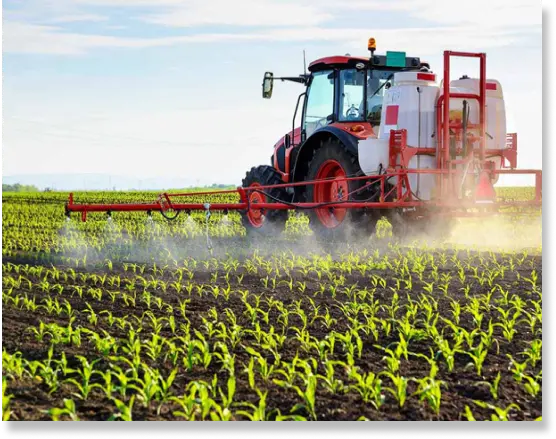Case Study | 08 February 2026
How Smart Irrigation Equipment Helped Tackle the Global Water Crisis While Boosting Farm Yields in 2023
Posted by : Preeti Wani
Despite having a strong global presence in farm machinery, a US-based agricultural equipment company wanted to future-proof its offerings by leveraging automation and AI-driven precision irrigation technologies. With a robust market research strategy and strategic partnerships, it successfully entered one of the most critical agri-tech subdomains of the decade.

An overview:
- A well-established manufacturer of agricultural technologies from the United States set out to innovate within the irrigation systems market by building AI-enabled smart irrigation solutions tailored for large-scale commercial farms and smallholder operations alike. Its primary goal was to reduce water wastage, improve yield quality, and position itself at the forefront of sustainable agriculture solutions by 2030.
- Although the company had already rolled out several products across the irrigation segment, it lacked a targeted approach to penetrate emerging markets. Additionally, the firm faced hurdles such as scattered customer behavior, regional variability in climate, and poor digital connectivity in key agricultural zones.
- Research Nester experts entered and used their business canvas model to analyze the commercial viability of AI-powered irrigation systems, identifying long-term growth potential, prioritizing user needs, and observing competitors’ strengths and weaknesses in untapped regions.


The Story
The agriculture sector is under high pressure as the global water crisis increases. According to estimates by the FAO, around 70% of global freshwater withdrawal is used for agriculture. Yet, inefficiencies in water delivery systems lead to substantial waste, especially in regions with open canal systems and poor water management infrastructure.
Recognizing the need to address this crisis while supporting farmers to maintain yield performance, the client, a legacy farm equipment manufacturer, wanted to transform toward AI-enabled precision irrigation systems. These systems could monitor soil moisture levels, weather conditions, and crop types to find out optimal watering schedules in real-time.
When Research Nester was brought in, the company was undergoing several barriers, such as:
- Increased development cost of AI-integrated hardware and cloud analytics platforms.
- Low digital literacy among farmers in developing nations, leading to hesitancy in adoption.
- Scattered data sets and inconsistent climatic patterns that challenged AI model training.
- Policy restrictions and regulatory challenges in exporting smart irrigation systems to water-stressed regions.
To stay ahead of the competition and adhere to global sustainability benchmarks, the company needed a solution that balanced innovation with market feasibility and scalability.
Our Solution:
Research Nester’s analysts performed a comprehensive value proposition assessment across five core pillars, i.e., product innovation, market fit, user accessibility, regulatory landscape, and revenue potential. Here’s how the approach helped change the client’s business:
- Customer-Centric Product Development: By segmenting potential users into three core categories, such as large-scale commercial farms, cooperatives, and individual smallholders, Research Nester helped the client modify its AI platform into modular, scalable units. The smart irrigation system was made to operate efficiently even with restricted internet access through edge computing and localized weather sensors.
- Competitive Analysis and Differentiation Strategy: Using SWOT analysis and benchmarking against global leaders in smart agri-tech, the team uncovered several gaps in competitor offerings. This allowed the client to add exclusive features such as predictive analytics for drought forecasting, automated valve control, and fertigation integration, helping it access a technological edge.
- Localization and Market Entry Tactics: To break into high-potential markets like India, Egypt, and Brazil, the company adopted region-specific calibration features, offered multi-language mobile interfaces, and formed partnerships with local agri-cooperatives and NGOs. This not only encouraged adoption but also created trust among first-time users.
- Strategic Partnerships: Research Nester also encouraged collaborations with water management NGOs, agricultural universities, and regional governments, allowing the company to co-develop pilot projects, collect field data, and drive policy engagements.
Research Nester’s Strategic Recommendations
- Multi-Tier Distribution Model: Develop a well-structured strategy that comprises direct-to-farm delivery channels for large-scale commercial players, along with a proper reseller and dealer network suited to reach smallholders.
- User-Driven Product Improvement Cycle: Frame a regular feedback loop from end-users to direct ongoing product updates. Target for biannual improvements based on real-world usage and evolving farmer needs.
- Government & NGO Partnership: Align with government-led water conservation initiatives and enter into climate-related funding schemes to reduce the financial burden on farmers and foster effective public–private partnerships.
- Integration with Agri-Tech Ecosystem: Enable compatibility with other precision farming tools such as soil health trackers, autonomous tractors, and weather data aggregators to build a unified digital farming system.


Results
The thorough market intelligence solutions by Research Nester gave the company access to important key insights on adoption behavior, water scarcity regions with possibly high agricultural outputs, and regulatory trends in water conservation. As a result, the company achieved commendable results as outlined below:
- Increased its sales of irrigation equipment by 17% in CY2023, which went up from 12% in CY2022.
- Stepped into five new countries across South Asia, Latin America, and North Africa, backed by hyperlocal customization of products.
- Granted USD 100 billion in R&D and partnerships to increase innovation in smart irrigation over the next decade.
- Saw a 12% revenue growth in 2023 due to increased demand for sustainable farming solutions.
- The company now plans to become a category leader in smart irrigation solutions globally by 2030.
Conclusion
The global agricultural landscape is changing swiftly, and companies must now innovate not just for-profit motive, but for environmental health and food security. Through appropriate market insights and a strategic execution plan offered by Research Nester, the client changed a complex challenge into a transformational opportunity, cementing its status as a pioneer in sustainable farm equipment.
By 2030, the company envisions delivering smart irrigation solutions to over 70 countries, contributing directly to the UN’s Sustainable Development Goals (SDGs), especially SDG 2, i.e., Zero Hunger and SDG 6, Clean Water & Sanitation.
customized message

Preeti Wani is a seasoned Manager – Research & Consulting at Research Nester, with over 10 years of diverse experience in the market research industry, including more than 3 years in a leadership role at the firm. Her expertise spans the Packaging (rigid, flexible, sustainable packaging, barrier technologies), Chemicals & Advanced Materials (specialty chemicals, polymers, coatings, adhesives, composites), and Metals, Minerals & Mining (ferrous/non-ferrous metals, rare earths, industrial minerals, mining technology) sectors.
At the core of her role, Preeti leads end-to-end research and consulting engagements, transforming complex client briefs into structured, insight-rich deliverables aligned with strategic business objectives. She brings a unique ability to balance deep analytical thinking with operational execution, managing cross-functional teams, streamlining research processes, and driving training programs to upskill teams and ensure methodological consistency.
Preeti is actively engaged in client communications, adept at capturing evolving requirements, resolving critical queries, and ensuring the on-time delivery of actionable, high-quality insights. Her consultative approach, combined with strong project management and clear communication, positions her as a trusted advisor for clients navigating fast-moving, innovation-intensive industries.
Recognized for her strategic foresight, leadership, and quality-driven mindset, Preeti continues to play a pivotal role in advancing both client outcomes and internal research excellence at Research Nester.
Thank you for contacting us!
We have received your request for proposal. Our research representative will contact you shortly.
Copyright @ 2026 Research Nester. All Rights Reserved.

